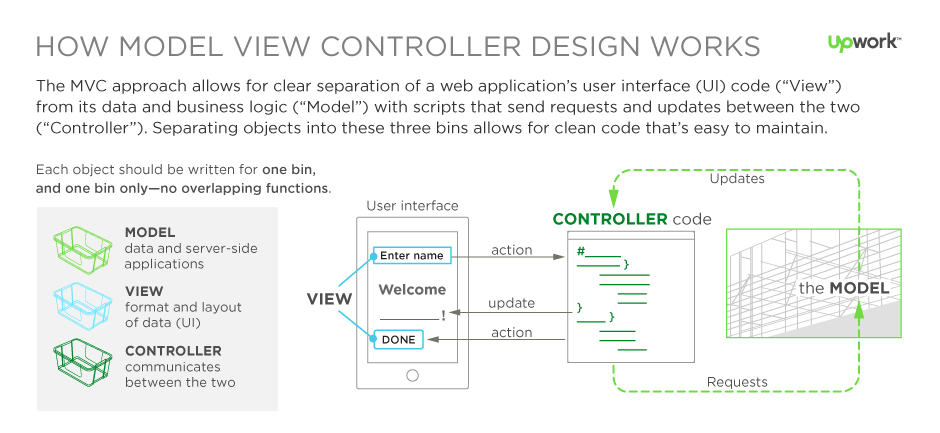
PHP still reigns supreme in the back-end development world, but which PHP framework is most loved by programmers?
According to Google Trends, the Laravel framework has been a favorite since its debut—surpassing other PHP frameworks like Zend, Symfony, and CodeIgniter over the years—but what makes it such a great tool? The short answer: built-in tools, libraries, and commands that make it easier than ever to build modern, secure real-time web applications.
It’s especially helpful for teams, keeping everyone in sync with Laravel’s database-agnostic migrations and schema builder.
Here’s a quick look at some of Laravel’s stand-out features.
Laravel’s “Artisan” Tool
You’ve probably heard of a command-line interface (CLI)—an interface where developers interact with frameworks and other computer programs. Well, Laravel has its very own interface: the Artisan Console. Artisan can help streamline and perform repetitive and complex tasks so developers don’t have to, with built-in commands that help out during the development process.
Database management made easy with Migrations
You can’t talk about Laravel without looking at the brilliant way it handles database migrations, Laravel’s answer to streamlining how databases are designed, managed and modified. Laravel’s creators say, “Migrations are like version control for your database, allowing your team to easily modify and share the application’s database schema. If you have ever had to tell a teammate to manually add a column to their local database schema, you’ve faced the problem that database migrations solve.”
Migrations start with an Artisan command, and each migration is time-stamped to help with version control issues—and with rolling back to prior versions, allowing you to recreate your entire database in one simple command. Plus, there’s more to Laravel and database management. Check out Eloquent ORM (object-relational mapping) for querying and manipulating your database.
Ship better apps faster with support from testing APIs and integrated unit testing
Speed is definitely one of Laravel’s selling points. With great, integrated unit testing support and excellent APIs, this MVC framework helps you get clean apps out the door fast on a deadline. PHPUnit is included out of the box, and Laravel provides APIs to support HTTP testing, file upload testing, JSON API testing, console tests, and the Laravel Dusk browser testing and automation API.
Front-end design made easy with Vue.js, lightweight templates, and other bundled components
Laravel bundles in the JavaScript UI framework Vue.js, and together these tools make a great team for complex front-ends. Upwork developer Leonardo Alvarez says, “Laravel helped expose Vue.js, a JavaScript framework we’ve chosen at Upwork, to the world. Quite a few Vue developers also know Laravel.” Vue is event-driven, and all about speed and performance. This makes it a natural partner with Laravel for fast, real-time applications.
Laravel’s own template engine, Blade, provides really lightweight front-end templates with everything included, from CSS and text to images. Lightweight is a term that gets thrown around a lot when it comes to frameworks, but why is it important? The manageability and size of an app’s code overall. The more bloat, the harder it is to manage and the slower it runs.
Simple, streamlined MVC design
In the same vein, Laravel uses the MVC programming paradigm, which is helpful to programmers in its mission to “separate concerns.” MVC is commonly used in backend frameworks—including other PHP contenders like CodeIgniter and CakePHP.
Top-notch security features
When it comes to security, Laravel makes it easy with out-of-the-box authentication and authorization, convenient email verification, a built-in encrypter (OpenSSL), and hashing. And, because Laravel acts as an intermediary system intercepting front-end requests to the server, it’s able to minimize website hacking via code injection.
Libraries that make it easier to add building blocks of code to your app
Laravel abstracts more complex processes into simpler building blocks—that’s the essence of object-oriented programming (OOP), which Laravel leverages with libraries that cover everything from Authentication to password hashing algorithms. This helps make applications more modular—and make it a perfect partner with UI libraries like Vue to build API-driven single-page applications quickly and easily (with reusable code).
Official packages and integrations that interface with third-party apps
Authentication is how many apps streamline user logins—you can learn more about the process in this article, but it requires a bit of integration to get up and running. Laravel’s Socialite package makes it even easier for developers to implement OAuth authentication from providers like Facebook, Twitter, LinkedIn, Google, GitHub and Bitbucket.
Ultimately, a developer is going to be your best resource for which framework is better for your particular project. But if you’re looking to create a complex, fast application that updates quickly with minimal calls to your backend (and fewer resources required), Laravel is an excellent option.
Upwork is a freelancing website where businesses of all sizes can find talented professionals across multiple disciplines and categories. If you are a business and are looking to get projects done, consider signing up!
